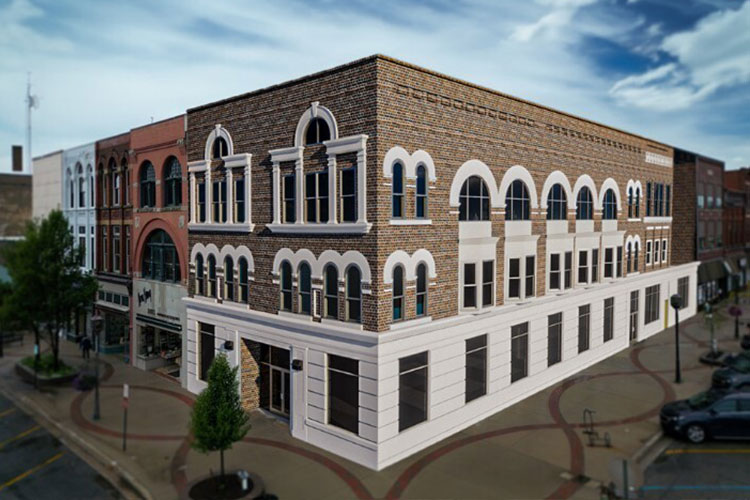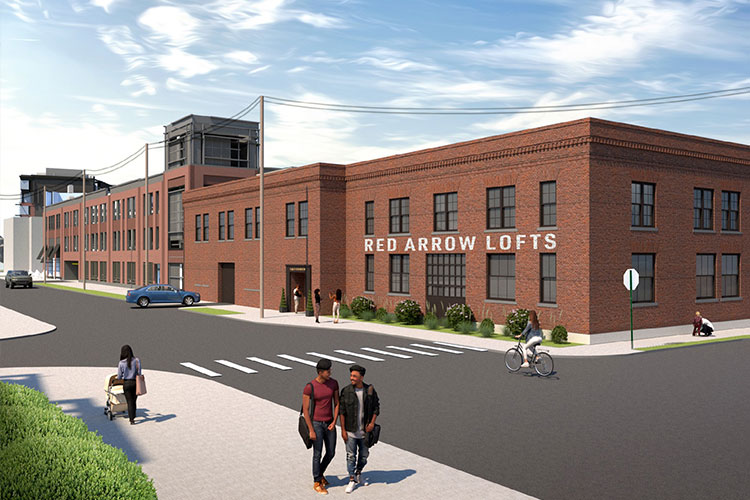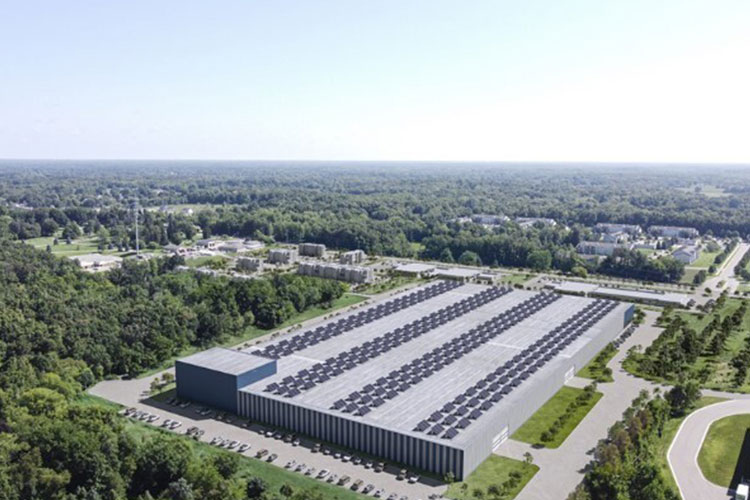
New Projects Continue to Drive Economic Prosperity Across Michigan
Tuesday, December 12, 2023
The Michigan Strategic Fund closes out 2023 with investments that support and grow businesses and communities across Michigan, while bringing new investment to the state

LANSING, Mich.—Today, Governor Gretchen Whitmer joined the Michigan Economic Development Corporation to announce Michigan Strategic Fund approval of a wide range of projects that, in total, will create or retain 956 jobs and generate nearly $253 million in investment in Michigan.
“Today’s projects will create or retain nearly 1,000 jobs and drive more than $250 million of investment in Michigan, building on our leadership in the future mobility industry and fostering strong economic opportunities for our communities,” said Governor Whitmer. “Since I took office, we have secured tens of thousands of auto jobs, won projects from other states and nations, and taken action to build on our momentum. Let’s keep working together to deliver on the priorities that make a real difference in people’s lives so anyone can ‘make it’ in Michigan.”
Electric truck manufacturer Scout Motors establishing new R&D facility in Novi, creating 200 high-wage jobs; project represents first new European-backed OEM to invest in Michigan in 20 years

Scout Motors Inc., headquartered in Tysons, Virginia, plans to establish a new research and development facility in the city of Novi, which will serve as a hub for future innovation and development for the auto industry within the U.S. The project is expected to generate a total capital investment of $11 million and create 200 high-wage jobs with the support of a $10 million Michigan Business Development Program performance-based grant. Michigan was chosen for the expansion over competing sites in several Southern states because of the strength of the automotive engineering talent in the state.
Read the full press release on Scout’s new R&D facility in Michigan. Learn more about careers with Scout Motors.
Investments in Holland signal continued growth in region’s high-tech EV, medical devices industries
ATC Drivetrain, Inc., plans to consolidate its Center of Excellence at a newly constructed facility in the city of Holland that will include space for battery remanufacturing, electric drive unit remanufacturing, electronics remanufacturing, and batter second life applications. The project is expected to generate a total capital investment of $7.9 million and create 163 jobs with the support of a $2 million Michigan Business Development Program performance-based grant.
ATC Drivetrain is a Farmington Hills, Michigan-based company providing environmentally friendly remanufacturing solutions for powertrain and drivetrain products regardless of the technology powering the vehicle. This includes batteries, electric drive units, engines, transmissions and other driveline products. ATC also offers engineering services that include warranty root cause analysis and testing, quality audits, production rework and recycling. ATC serves the global automotive and commercial vehicle industries from its facilities in the USA, United Kingdom, Germany and China.
This project supports the state’s work to position itself as the global leader in automotive manufacturing and will bring immediate job growth to West Michigan with an expanding auto supplier. It will also support ATC Drivetrain’s presence and future growth in the state.
“ATC’s growth and expansion is a testament to our commitment to innovation, sustainability and customer focus,” said George Kostopoulos, Vice President of Global Sales & Marketing at ATC Drivetrain. “We've evolved our focus in recent years to align with the changing landscape of the automotive industry. Our new facility in Holland, Michigan, along with other strategic investments, exemplifies our dedication to driving positive change and embracing the electrified future.”
The city of Holland has offered a property tax abatement in support of the project. Learn more about careers with ATC Drivetrain.
hg medical is a market-leading end-to-end contract manufacturer of highly complex orthopedic implants for the extremities and spinal sectors. It focuses on innovative systems pushing the boundaries of subtractive manufacturing technologies and advancing the possibilities for developing implantable devices. With existing facilities in Germany and the USA, the company has built a strong reputation for its deep engineering expertise in its core segment, high-quality manufacturing, and exceptional customer service. With its team of experienced engineers and technicians, hg medical offers a comprehensive range of services, including design for manufacture and development, prototyping, validation, and production of complex, high-quality implants.
hg medical has experienced significant growth since its positioning in North America and plans to double its organizational capacity with additional expansion of its U.S. manufacturing in the city of Holland. The company will establish a new world-class manufacturing facility in the former JCI facility to manufacture orthopedic extremity implants.
The project is expected to generate a total capital investment of $41 million and create 180 jobs, including highly skilled engineering professionals, technicians, and administrative workers, with the support of a $1.8 million Michigan Business Development Program performance-based grant. Michigan was chosen for the expansion over competing sites in Indiana, Minnesota, and Tennessee for the quality of its workforce.
The project will bring nearly 200 good-paying jobs and will significantly impact West Michigan’s growing life sciences and medical devices sector. It will also support the company’s future presence and investment in the state.
The Michigan Strategic Fund also approved a five-year State Essential Services Assessment exemption valued at $237,840 to support the project. The city of Holland anticipates approval of a property tax abatement in support of the project. In addition, West Michigan Works! plans to assist the project through workforce development support. Learn about careers with hg medical here.
As the proud home to 275 medical device and life sciences firms, from household industry names such as Pfizer and Stryker to upstarts like Tetra Therapeutics, Michigan is among the top 10 in the nation for medical device manufacturing companies.
Norm Fasteners constructing new manufacturing facility in Bath Charter Township, creating 200 well-paying jobs
Norm Fasteners Co., plans to construct a new manufacturing facility in Bath Charter Township, where it will manufacture externally threaded fasteners.
The company, established in 2018 in Lansing, is a subsidiary of Norm Holdings A.S. of Turkey and is a leading manufacturer of various connectors from bolts to fasteners, and has also diversified into machines, logistics, high-quality parts, and marketing services. Norm Fasteners imports fasteners from its parent company and distributes them to customers in the automotive including heavy duty trucks, agriculture, electronics, housing and furniture industries in North America.
The project represents the parent company’s first manufacturing facility in the U.S. The project is expected to generate a total capital investment of $77 million and create 200 well-paying jobs with the support of a $1.6 million Michigan Business Development Program performance-based grant. The company currently employs 18 individuals in Michigan, with the state chosen for this expansion over competing sites in Ohio, Texas, Canada and Mexico as a result of our strong automotive OEM and auto supplier presence.
“Norm Fasteners Co., is looking forward to working with LEAP, MEDC, local organizations and officials on our expansion plans,” said Norm Fasteners USA Business Unit Director Koray Gurbuz. “We appreciate the opportunity to land our first manufacturing investment outside our home country, in Bath Charter Township in Michigan. We are grateful to see that our goals are being recognized and supported by the local community. We are committed to sustainability and eager to grow into an important player in Michigan’s EV supply chain.”
The project will bring immediate, high-wage jobs with a large and growing manufacturer and boosts the state’s work to position itself as the global leader in the future of mobility, and will solidify the company’s presence and future business in the state.
Bath Charter Township anticipates approval of a property tax abatement in support of the project. Norm Fasteners has selected Dymaxion Development of Lansing as the development partner on the project. For information on careers with Norm Fasteners, visit https://normholding.com/en/.
WK Kellogg Co expansion in Battle Creek will retain 170, create 43 high-wage jobs, boost state’s agribusiness industry
WK Kellogg Co was established in 2023 as a standalone company, resulting from the separation of the former Kellogg Company into two separate entities, Kellanova and WK Kellogg Co. WK Kellogg Co is focused on its founder’s original business – ready-to-eat cereal. The company employs approximately 750 employees – nearly one-third of its total North America employee base – in Michigan and will continue to be headquartered in Battle Creek, where it has spent the past 117 years as Kellogg Company.
In 2021, Kellogg Company announced that by the end of 2023, it would move production of some of its Battle Creek cereal plant volume to its cereal production facility in Ontario, CA. This project would have idled two of the three lines currently operating in Battle Creek.
Recently, WK Kellogg Co leaders decided to retain that volume at its Battle Creek facility, where the company will drive efficiency through investment in more modern technology, as well as train employees in high performing work systems, making them more competitive in their manufacturing network. These changes will result in the retention of approximately 170 jobs in Battle Creek and – along with the partnership and support of the state and city of Battle Creek – help to position the plant for future investment and potential growth.
The project is expected to generate a total capital investment of at least $44 million and create at least 43 new high-paying jobs – in addition to the 170 roles being retained – with the support of a $5 million Michigan Business Development Program performance-based grant. The Michigan Strategic Fund also approved a 15-year MSF Designated Renaissance Zone in support of the project.
“We are pleased to maintain cereal production in Battle Creek, the Michigan community where it all began more than a century ago and where it begins again with WK Kellogg Co,” said WK Kellogg Co Chairman and CEO Gary Pilnick. “We are proud to be doing so in partnership with our employees and their union, along with the support of Battle Creek Unlimited, the city of Battle Creek and the state of Michigan.”
In addition to investing in machinery and equipment, the project will include training current employees to enable the high-performing work team model necessary to drive future success. In total, the project will retain and/or create at least 213 jobs, all with wages and health care benefits that are among the best in Michigan manufacturing.
In addition to the state grant, the Battle Creek City Commission approved, and Mayor Mark Behnke signed, the application for the Renaissance Zone and Battle Creek Unlimited has offered a $250,000 grant in support of the project.
Historic building in downtown Owosso to be renovated into mixed-use development, add vibrancy and needed housing to the community
Woodworth Investments plans to rehabilitate a historic, three-story building located on the corner of W. Exchange and N. Washington Streets in downtown Owosso into a mixed-use development. When complete, the project will include reactivated commercial space on the first floor and nine residential rental units. The first floor currently houses Fifth Third Bank which will remain as a long-term tenant. The second and third floors will be used for the residential units and common space for the residents. The concrete and masonry façade will also be improved both structurally and aesthetically, bringing it back to national historic preservation standards.

The project is expected to generate a total capital investment of $4.7 million with the support of a $1.48 million Michigan Community Revitalization Program performance-based grant. The City of Owosso Brownfield Redevelopment Authority also received MSF approval of state tax capture valued at $248,139 for the reimbursement of brownfield activities at the site.
The project will bring much-needed housing to downtown Owosso while also reactivating a historic, architecturally distinguished building in the heart of downtown. In addition, it will promote walkability and drive additional foot traffic, and serve as a catalyst for future development Owosso’s historic downtown district.
“I can't recall a time in our lives where such a significant investment was made in our central business district,” said Developer James Woodworth. “Our hope is that this development will spearhead additional projects in Owosso, while supporting our mission to increase foot traffic for all downtown businesses.”
The city of Owosso is supporting the project through the local portion of the brownfield plan valued at $154,856 and a 12-year Obsolete Property Rehabilitation Act tax abatement valued at $212,780. The city of Owosso is engaged with MEDC’s Redevelopment Ready Communities (RRC) program.
Three new developments in Detroit’s Corktown neighborhood helping drive Detroit’s continued revitalization, bringing attainable housing options near Ford’s Central Station District
The following projects are three of the proposed housing developments to be constructed to meet the city of Detroit’s housing goals. In June of 2018, Ford Motor Company acquired the iconic Michigan Central Train Station in the Corktown Neighborhood. Ford's investment in the Corktown Campus is significant with $700 million invested and approximately 5,000 jobs in the area.
To prepare for this investment, the city of Detroit launched the Greater Corktown Neighborhood Framework Plan (the “GCF Plan”) to ensure the transformation is inclusive of existing residents. With demand for housing increasing, the need to preserve and grow affordable housing is critical. The GCF Plan involves the development of approximately 841 mixed income housing units within nine development phases in the North Corktown and Historic Corktown neighborhoods of Detroit.

Left Field II 2022, LLC plans to construct a new, four-story multifamily apartment building on vacant land near the left field area of the former Tiger Stadium site in the Corktown neighborhood of Detroit. When completed, the building will include three stories of housing with 53 units and parking on the first floor.
The project is expected to generate a total capital investment of $16.3 million with the support of a $2.7 million Michigan Community Revitalization Program performance-based loan. The building has been designed in conjunction with the neighboring 60-unit apartment building and the larger site that encompasses the former Tiger Stadium ballpark, incorporating design features encouraged in dense, urban, walkable communities.
The Red Arrow Redevelopment Project will rehabilitate an existing, historic two-story former industrial building into a 28-unit multifamily housing complex within the Historic Corktown District of Detroit. The project also includes public improvements including new sidewalks, landscaped areas, and adjoining street improvements.

The project is expected to generate a total capital investment of $12.8 million with the support of a $2.2 million MCRP performance-based loan participation. In addition, the City of Detroit Brownfield Redevelopment Authority also received MSF approval of state tax capture valued at $464,643 for the reimbursement of brownfield activities at the site.
The Preserve on Ash I plans to redevelop approximately 2.16 acres of vacant land in the North Corktown neighborhood of Detroit into five two-story buildings consisting of 69 mixed-income housing units and commercial space. The income mix includes units with MSHDA project-based vouchers, units that are rent and income restricted to 60 percent of Area Median Income, and market-rate units.
The project is expected to generate a total capital investment of $37.9 million with the support of a $2.3 million MCRP performance-based loan. The project is also in the initial phase of the Greater Corktown Framework Plan for the city of Detroit. The project will create developments on formerly blighted land that will improve streetscapes and walkability for the residents and surrounding neighbors.
Read the full press release about the three Corktown projects.
The Michigan Strategic Fund also took the following actions that will increase and retain top talent for Michigan’s electric vehicle and mobility sector and expand support to Michigan’s entrepreneurs:
- Approval of amendments to the Michigander Scholars program – Originally approved as a pilot program by the Michigan Strategic Fund in February, the Michigander Scholars program was designed to work in partnership with University of Michigan, Michigan State University, and Michigan Technological University to retain top talent in the electric vehicle and mobility industry in the state. Since then, the program has brought in more than 400 college engineering students to consider careers in EV and mobility.
The board today approved several amendments to the program:
- Award new grants to Kettering University and Wayne State University, adding them to the group of eligible institutions;
- Extend the terms of the existing grants with the original three participating universities;
- Expand the participating employers to include any company with a Michigan location as long as that company executes a letter of intent with one or more of the eligible institutions to host internships and hire students as full-time employees in Michigan.
With these expansions, the program will provide participating students with a broader range of high-wage career options and also boost the state’s efforts to promote careers and recruit talent to fill jobs in Michigan’s surging electric vehicle and transportation mobility.
- Support for Michigan’s entrepreneurial and startup ecosystem – Approval of 2024 allocation of funds to support the continuation of entrepreneurship programs through the Statewide University Technology programs totaling $4.5 million:
- Michigan Translational Research and Commercialization, or MTRAC, statewide program funding of $550,000 to Michigan State University for the Agriculture Biology Innovation Hub;
- MTRAC funding of $1 million to University of Michigan for the Advanced Transportation Innovation Hub;
Allocation of $800,000 to U-M for the Technology Transfer Talent Network Grant; - MTRAC allocation of $400,000 to MSU for the Advance Early Stage Proof of Concept fund;
- MTRAC of $325,000 to Michigan Technological University for the Advanced Materials Innovation Hub;
- MTRAC allocation of $1 million to U-M for the Life Sciences Innovation Hub;
- MTRAC funding of $425,000 to Wayne State University for the Advanced Computing Innovation Hub.
“2023 was a productive year for Team Michigan, and we remain laser-focused on continuing that momentum into 2024 by attracting and developing our people, supporting vibrant places and winning projects that will deliver an even more prosperous future for Michiganders on both peninsulas,” said Michigan Economic Development Corporation CEO and Michigan Strategic Fund President and Chair Quentin Messer Jr. “As we look ahead to the new year, we will remain committed to working closely with Governor Whitmer, legislators from both parties, the MSF board and local officials to ensure our efforts create economic opportunities and prosperity, and strive to help more friends and neighbors Make It In Michigan.”
Other local voices in support of today’s projects:
ATC Drivetrain, Inc:
“This expansion is a sign of our region’s growing advanced energy storage cluster and proof of the West Michigan lakeshore region’s leadership in innovation at a transformative time for the automotive industry,” said Jennifer Owens, president of Lakeshore Advantage. “Today’s announcement puts a spotlight to the ingenuity that is characteristic of this region’s workforce and marks the start of many more good job opportunities for Allegan and Ottawa County residents.”
“ATC Drivetrain’s decision to expand in the city of Holland is a testament to this community’s strong manufacturing workforce and Holland as a great place to grow a business,” said Holland City Manager Keith Van Beek. “We are excited for the good-paying jobs this investment will bring for Holland residents. ATC’s continued growth in this community will be an asset to the City’s economy and quality of life.”
hg medical:
“We are delighted that hg medical has selected Holland as it expands its North American operations,” said Jennifer Owens, president of Lakeshore Advantage. “West Michigan’s best kept secret is its engineering workforce that is second to none. We look forward to welcoming hg medical to the West Michigan lakeshore region’s business community.”
“hg medical USA’s expansion is an exciting opportunity,” said Holland Mayor Nathan Bocks. “Holland is known for hard work and innovation in a business-friendly environment. And we are a great place to live, work, and raise a family. We look forward to welcoming hg medical USA, their employees, and families into our Holland community.”
Norm Fasteners Co.:
“LEAP continues to aggressively grow the EV supply chain throughout the Lansing region,” said Lansing Economic Area Partnership President and CEO Bob Trezise. “LEAP has methodically worked on this project for nearly seven years. The international competition for this EV plant was fierce, but through the incredible partnerships of MEDC, LEAP, Bath Township, and many others in the Lansing region, we have another major foreign direct investment victory for Michigan, the Lansing region, and Clinton County. I must note the particularly outstanding efforts of the entire MEDC team, over the last weeks, to successfully cross the finish line.”
“The Bath Township Board of Trustees voted overwhelmingly to partner with Norm Fasteners to bring new jobs and opportunity to Bath Township residents,” said Bath Charter Township Supervisor Ryan Fewin-Bliss. “Those who live in Bath know best why an international corporation would choose our township to build their first American manufacturing facility – we have natural beauty, access to infrastructure, and a strong sense of community. We welcome our new neighbors.”
Scout Motors:
“There are more than 86,000 engineers in Metro Detroit, many who work in one of the world’s most innovative automotive industry clusters – you can’t find that level of specialized technical talent anywhere else in North America,” said Maureen Donohue Krauss, president and CEO of the Detroit Regional Partnership. “Companies that are developing next-generation EV technology continue to move here from around the world to tap into our highly skilled workforce and global mobility leadership, all in the Global Epicenter of Mobility. We’re thrilled to welcome Scout Motors to the Detroit Region."
WK Kellogg Co:
“Battle Creek Unlimited applauds the leadership at WK Kellogg Co, the MEDC and the city of Battle Creek for their efforts to keep these positions in Battle Creek,” said Battle Creek Unlimited President & CEO Joe Sobieralski. “The manufacturing jobs at WK Kellogg Co’s Battle Creek facility are some of the highest-paid in Michigan. The MEDC went above and beyond to find a creative solution to support this project, which not only retains 170 jobs but also adds more than 40 new positions and sets the stage for future opportunities. We greatly appreciate WK Kellogg Co's commitment to Battle Creek and are excited for what’s to come.”
“Mayor Behnke, the City Commission, and Battle Creek Unlimited have been committed to economic development innovations and investments that seek to grow and improve our Battle Creek community,” said Battle Creek City Manager Rebecca Fleury. “We are pleased to see WK Kellogg Co receive the state of Michigan's support in retaining and investing in well-paying jobs in Battle Creek and are excited to see this historic company's growth in ways that will bring the company, employees, and the community future success.”
Woodworth Investments:
"In the heart of Owosso's historic downtown, a transformative project is underway to revive this cherished building,” said Owosso Mayor Robert J. Teich. “Local tax incentives, granted by the City, are facilitating the integration of modern living and commercial spaces. As the developers pursue state grant support, our collective vision is to rejuvenate downtown Owosso, creating a dynamic community hub. With the backing of the state and with community support, this is another step towards our downtown transformation with an eye on historic preservation.”
About Michigan Economic Development Corporation (MEDC)
The Michigan Economic Development Corporation is the state’s marketing arm and lead advocate for business development, job awareness and community development with the focus on growing Michigan’s economy. For more information on the MEDC and our initiatives, visit www.MichiganBusiness.org. For Pure Michigan® tourism information, your trip begins at www.michigan.org. Join the conversation on: Facebook Instagram LinkedIn, and Twitter.
Recent Press Releases
